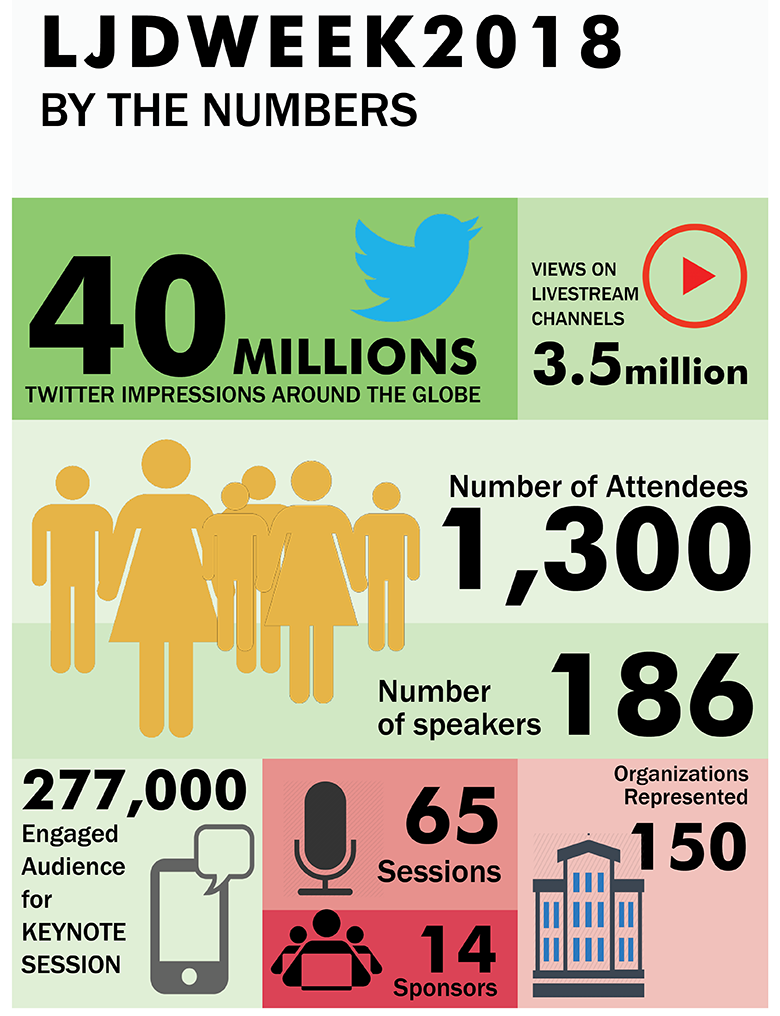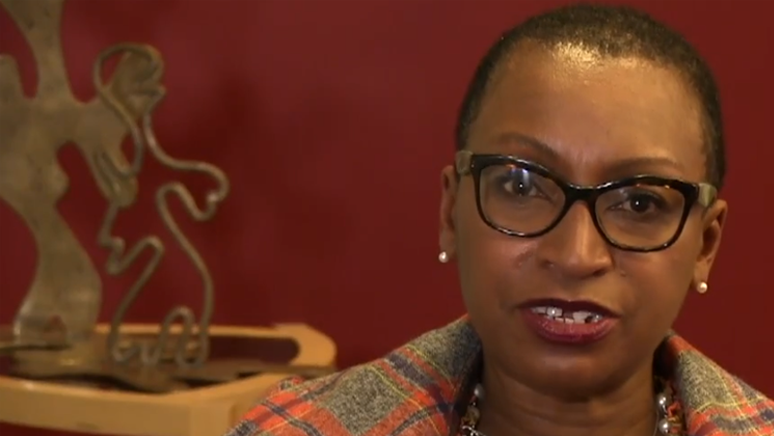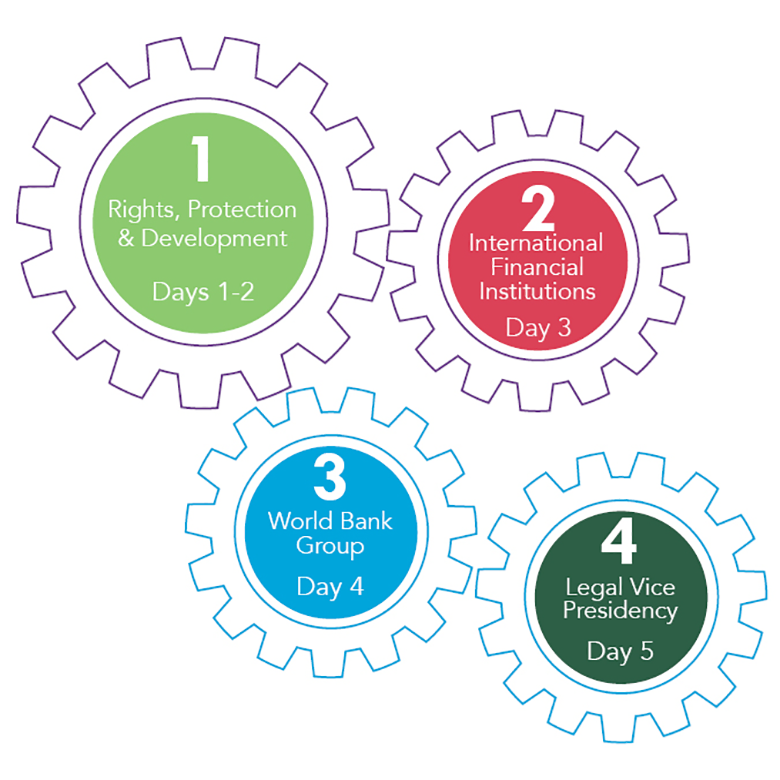THIS YEAR'S STRUCTURE
Each day of LJD Week 2018 will center on the following focus areas.
Day 1 & 2 — Rights, Protection and Development Days
The final events will be selected based on the responses to the call for proposals. The topics that will receive priority consideration include:
- Issues related to displaced persons or refugees relating to Fragile, Conflict and Violence affected states. This includes issues relating to preventing negative impacts of forced displacement, strengthening resilience to those who stay behind, supporting host communities, helping the forcibly displaced, and supporting returnees and returning communities. This also includes addressing issues of sexual and gender-based violence; sexual exploitation and abuse, restitution, truth and reconciliation.
- Links between rights and economic empowerment of disadvantaged or vulnerable individuals or groups. Disadvantaged or vulnerable individuals or groups include those discriminated against based on the following factors: age, gender, ethnicity, religion, physical, mental or other disability, social, civic, or health status, sexual orientation, gender identity, economic disadvantages or indigenous status, and/or dependence on unique natural resources.
- Ability to exercise rights. This includes access to justice, alternative dispute resolution, interacting with public institutions, representation in public institutions (such as courts), safe transport and infrastructure.
- Digital rights. This includes rights to privacy, digital identification, data protection, and the General Data Protection Regulation (GDPR).
- Case studies and success stories. This will include examples of projects where rights and protection had a significant impact on development outcomes. Examples of projects involving private investment are encouraged.
Day 3 — International Financial Institution (IFI) Day
The IFI Day will explore issues common to International Financial Institutions, with a focus on Rights, Protection and Development and other selected topics. The highlight of the IFI Day will include a roundtable discussion between the various multilateral development bank general counsel. Other topics to be covered will be of interest to international financial institutions including:
- The World Bank Environmental and Social Framework.
- Data privacy and protection issues.
- Development finance emerging trends and their implications on the IDA Inaugural Bond.
- Refugee finance and related instruments.
- Managing risk around public private partnerships.
- Legal implications of disruptive technologies on IFIs.
Day 4 — World Bank Group Day
The World Bank day will focus on issues related to World Bank Group Operations and activities. These sessions will be open to all staff members of the World Bank Group and International Monetary Fund. The sessions will focus on the following topics:
- Environmental and Social Framework
- Maximizing Finance for Development
- Disruptive Technologies
- FCV issues
- Gender
- Data privacy
There will also be a meeting of the Global Forum for Law, Justice and Development (GFLJD) Steering Committee and their working groups. The sessions related to the GFLJD will be open to members of the GFLJD.
Day 5 — Legal Vice Presidency Day
The Legal Vice Presidency Day will allow for the sharing of knowledge and best practices within LEG through diverse training opportunities around rights, protection and development. These sessions are open only to members of the Legal Vice Presidency of the World Bank.
Sessions for the Legal Vice Presidency learnings will be focused on practical skills development. Topics for learning will be related to the Legal Vice Presidency Thematic Working Groups and topics as requested by LEG staff. Each LEG unit will also have a team meeting to discuss learning topics directly related to their individual work programs.
SESSION FORMATS
This year’s LJD Week will place enhanced emphasis on shorter and more creative session formats. Sessions will therefore be between 7 and 30 minutes long and can be followed live through social media to further interaction and engagement.
Panel and Roundtable formats will not be offered as options in the call for proposals. These formats will be reserved for gatherings of development partners and other stakeholders to discuss specific development priorities identified by the LJD Week Team.
INSPIRING—TED-STYLE TALK
What—Presentation of a well-formed and compelling new idea that challenges existing beliefs. Presentation is under 15 minutes.
Who—One speaker.
Duration—15 minutes followed by Q&A.
How—Presentation format.
ILLUMINATING—LIGHTNING TALK
What—Presentation in which the presenter shares creative and innovative ideas, thoughts, etc.
Who—One speaker at a time. Session includes several consecutive presenters.
Duration—Circa 7 minutes.
How—Presentation format where maximum 20 slides are shown for maximum 20 seconds each to keep the talk concise and fast-paced. Presentation will be timed.
INQUISITIVE—INTERVIEW
What—Interview with approximately five questions. Answers are as succinct as possible.
Who—One speaker and one interviewer.
Duration—30 minutes.
How—An interviewer will pose challenging questions to the speaker. Questions and answers may be prepared in advance.
INFORMATIVE—FIRESIDE CHAT
What—Fast-paced conversation between 2-3 speakers, where different points of view around a common, well identified and explained topic are covered. The conversation is well prepared and appears informal and natural.
Who—Two (or maximum three) speakers.
Duration—30 minutes.
How—Two speakers sit on armchairs facing each other. The discussion topic is initially presented in three minutes by one of the speakers that will be followed by a back-and-forth between the speakers. Last two minutes are devoted to summary and wrap up.
ARGUMENTATIVE—COURTROOM
What—The topic is presented by two sides (prosecutor and defendant) that are in disagreement and try to convince the audience (jury) by arguing in favor or against the topic presented at the beginning by the moderator.
Who—Two speakers and a moderator.
Duration—30 minutes.
How—The topic is introduced by the moderator in the first three minutes. Subsequently, the moderator opens the floor to the two experts, each of whom have three minutes to present their own side/angle. A debate between the two experts follows for 10 minutes. In the end, the audience will vote to decide which argument was more convincing.
CHALLENGING—Q&A
What—Questions around a common theme are submitted by LJD Week 2018 participants and answered by an expert.
Who—One speaker.
Duration—30 minutes.
How—Session will kick off with a short, maximum 5-minute-long presentation and the remainder of the allotted time will be spent answering queries. LJD Week team will solicit questions among LJD Week 2018 participants in advance. Questions are submitted and vetted by LJD Week team following submission. Speaker will get the chance in advance to select queries s/he wishes to answer during this session. Answers are as succinct as possible.
ENGAGING—GAME/QUIZ
What—Game or quiz with audience.
Who—One or multiple speakers.
Duration—30 minutes.
How—This format allows for a lot of flexibility around the “how.” It can be a quiz for the audience with questions related to a topic or a game with the audience. Speaker(s) will be responsible for providing the solution and explanation after each quiz.



